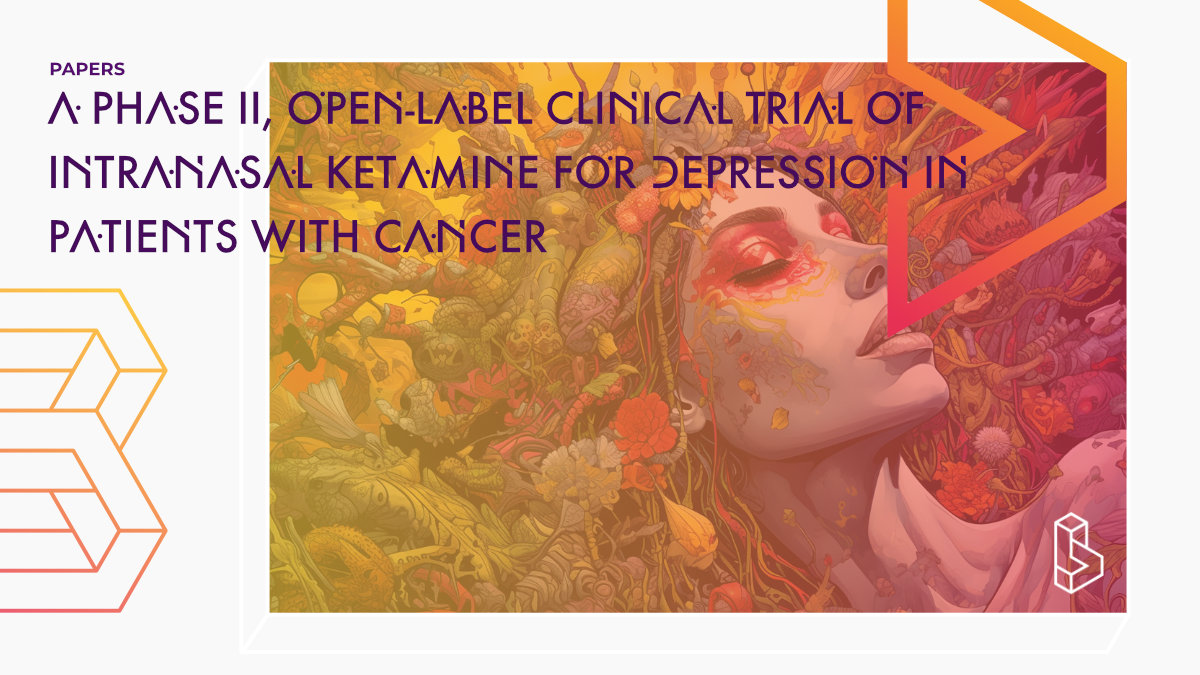This open-label study (n=20) finds that ketamine (intranasal, 3x, 50-150mg) reduced depression in patients with cancer who were receiving palliative care. On day eight (one day after the last dose), the response and remission rates were 70% and 45%, respectively. The effects were partially sustained in the second week.
Abstract of a Phase II, Open-Label Clinical Trial of Intranasal Ketamine for Depression in Patients with Cancer Receiving Palliative Care
“Antidepressants require several weeks for the onset of action, a lag time that may exceed life expectancy in palliative care. Ketamine has demonstrated rapid antidepressant effects, but has been minimally studied in cancer and palliative care populations. Herein, the objective was to determine the feasibility, safety, tolerability and preliminary efficacy of intranasal racemic ketamine for major depressive disorder (MDD) in patients with advanced cancer. We conducted a single-arm, open-label phase II trial at the Princess Margaret Cancer Centre in Toronto, ON, Canada. Participants with advanced cancer with moderate to severe MDD received three flexible doses of intranasal (IN) ketamine (50–150 mg) over a one-week period. The primary efficacy outcome was an antidepressant response and remission rates as determined by the Montgomery–Åsberg Depression Rating Scale (MADRS) from baseline to the Day 8 primary endpoint. Twenty participants were enrolled in the trial, receiving at least one dose of IN ketamine, with fifteen participants receiving all three doses. The Day 8 antidepressant response (MADRS decreased by >50%) and remission (MADRS < 10 on Day 8) rates were high at 70% and 45%, respectively. Mean MADRS scores decreased significantly from baseline (mean MADRS of 31, standard deviation 7.6) to Day 8 (11 +/− 7.4) with an overall decrease of 20 points (p < 0.001). Antidepressant effects were partially sustained in the second week in the absence of additional ketamine doses, with a Day 14 mean MADRS score of 14 +/− 9.9. Common adverse effects included fatigue, dissociation, nausea, dysgeusia and headaches; almost all adverse effects were mild and transient, resolving within 2 h of each ketamine dose with one dropout related to adverse effects (negative dissociative episode). Given these promising findings, larger, controlled trials are merited.”
Authors: Joshua D. Rosenblat, Froukje E. deVries, Zoe Doyle, Roger S. McIntyre, Gary Rodin, Camilla Zimmermann, Ernie Mak, Breffni Hannon, Christian Schulz-Quach, Aida Al Kindy, Zeal Patel & Madeline Li
Summary of a Phase II, Open-Label Clinical Trial of Intranasal Ketamine for Depression in Patients with Cancer Receiving Palliative Care
Major depressive disorder (MDD) is common in patients with advanced cancer, and is an independent risk factor for poor prognosis, reduced survival and increased pain. Early and effective treatment of depression is essential to reduce end-of-life distress and improve the quality of life in patients with advanced cancer.
Ketamine may be a good candidate for treating advanced cancer, given its robust and rapid antidepressant effects. It can be self-administered at home, and is safe and tolerable.
Ketamine has been routinely and safely administered through a variety of routes for the management of pain in palliative care settings, with less research evaluating antidepressant effects in this population. We examined the feasibility, safety and preliminary efficacy of IN ketamine for moderate to severe MDD in individuals receiving palliative care.
Find this paper
https://doi.org/10.3390/cancers15020400
Open Access | Google Scholar | Backup | 🕊
Cite this paper (APA)
Rosenblat, J. D., deVries, F. E., Doyle, Z., McIntyre, R. S., Rodin, G., Zimmermann, C., ... & Li, M. (2023). A Phase II, Open-Label Clinical Trial of Intranasal Ketamine for Depression in Patients with Cancer Receiving Palliative Care (INKeD-PC Study). Cancers, 15(2), 400.
Study details
Compounds studied
Ketamine
Topics studied
Palliative Care
Depression
Study characteristics
Open-Label
Participants
20
Humans
Authors
Authors associated with this publication with profiles on Blossom
Joshua RosenblatJoshua Rosenblat is a psychiatrist and clinician-researcher at the Mood Disorders Psychopharmacology Unit at the University of Toronto. He is also the Medical Director of the Canadian Rapid Treatment Centre of Excellence (CRCTE), Chief Medical & Scientific Officer of Braxia Scientific and co-founder of 1907 Research.
Compound Details
The psychedelics given at which dose and how many times
Ketamine 50 - 150mg | 1x
Linked Clinical Trial
Study of Ketamine for Depression in Cancer Patients Receiving Palliative CareThis is a phase 2 study of the drug ketamine for the treatment of depression in cancer patients receiving palliative care.

